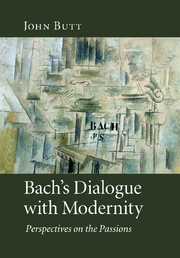Book contents
- Frontmatter
- Contents
- Preface
- List of abbreviations
- Introduction
- 1 Bach's Passions and the construction of early modern subjectivities
- 2 Bach's Passions and the textures of time
- 3 The hermeneutic perspective – negotiating the poles of faith and suspicion
- 4 The voices we hear and the construction of narrative authority
- 5 Between rhetoric and dialectic – Bach's inventive stance
- Afterword
- Appendix
- Bibliography
- Index
4 - The voices we hear and the construction of narrative authority
Published online by Cambridge University Press: 26 February 2010
- Frontmatter
- Contents
- Preface
- List of abbreviations
- Introduction
- 1 Bach's Passions and the construction of early modern subjectivities
- 2 Bach's Passions and the textures of time
- 3 The hermeneutic perspective – negotiating the poles of faith and suspicion
- 4 The voices we hear and the construction of narrative authority
- 5 Between rhetoric and dialectic – Bach's inventive stance
- Afterword
- Appendix
- Bibliography
- Index
Summary
The question of whether the music ‘means’ anything in relation to its text leads to another, related, question: whose voice are we hearing? Is such a voice convincing, consistent or even truthful? Does music provide a platform for multiple voices or does it, in itself, constitute a particular voice behind that of the text? Do text and music together constitute parts of the same voice or complex of voices? Obviously, these questions rely on some of the issues brought up by previous chapters, namely, subjectivity, the experience and manipulation of time, and hermeneutics, but they also provide a stronger focus on the role of the listener as essential to the way voices are constructed and perceived. WhileChapter 3 was concerned with the way meaning could be constructed, this chapter addresses the various sources of authority lying behind the discourse.
Consideration of the listener moreover includes the need to account for the portfolio of beliefs and expectations that he or she might bring to the performance. There are perhaps three broadly defined categories by which listeners have historically inferred who or what is speaking in a Bach Passion. First, the music might mirror and amplify the Gospel text, together with the various interpretative glosses, which to a believer might mean that it is representing (or at least serving) the voice of God.
- Type
- Chapter
- Information
- Bach's Dialogue with ModernityPerspectives on the Passions, pp. 193 - 239Publisher: Cambridge University PressPrint publication year: 2010

